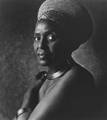The Voice of Defiance - Miriam Makeba
Pandering to no one – neither the system nor authority – “Mama Africa” Miriam Makeba left an indelible mark in history with her dedicated efforts in anti-apartheid campaigning.

One could never have imagined the power of the sonics, particularly how a voice could spur movements in dismantling racial injustice. Against all currents, Miriam Makeba posited the power of voices and thereafter – and for eternity – proved its underrated value upon her fight against apartheid. Not only was Makeba born in the suburbs of Johannasburg, but she’s also born into tunes and music, singing church gospels from a young age.
In the wake of her father’s death, Makeba, for a short spell, took up a job in cleaning houses just to help her family make ends meet. The arduous work coupled with the struggle of poverty, nevertheless, piqued Makeba’s burning passion in music, only more ablaze. She’d found comfort in performing in front of a crowd.
"I kept my culture. I kept the music of my roots. Through my music I became this voice and image of Africa and the people without even realizing."
A cipher for Blacks, the gospels were a means to praise, to rejoice, and to collectively live through discrimination. A different kind of resilience, only kept inside the church. This very strain of resistance permeated in Makeba’s veins whilst she embarked on enlisting bands after bands – from her cousin’s Cuban Brothers to Africa-touring with the flaming-hot Manhattan Brothers, and racking up stages with all-women group, the Skylarks.
Catapulting her to the A-list – both locally and internationally – was her appearance in the films Come Back Africa, where she played herself, singing two songs in a shebeen. Her scintillating performance, too, entailed her female lead role in Todd Matshikiza’s King Kong. That’s where she became the moment ever since.

Image rights to Paul Weinberg
It went naturally that she married her King Kong co-star, Hugh Masekela, in 1964, and doubled down on her career taking refuge in London, and later immigrating to New York. Plotting her course to the West, the avid endorsement by the likes of Miles Davis and Nina Simone paved the way to her veritable performance for former US President John F. Kennedy at Madison Square Garden in 1962, marking her career height.
"I do not sing politics. I merely sing the truth."
Shining her way through stardom in America, Makeba won a Grammy award for An Evening with Harry Belafonte in 1965, two years before making Pata Pata a Top-Ten worldwide hit. First time ever by a black woman. Pata Pata and her other mega hit, the Click Song, remained her most well-known tracks throughout her career.
Becoming one of the most feted singers in the United States – the first ever African musician to leave the land of South Africa since apartheid – Makeba then discovered the denial of her reentry into South Africa in an attempt to remorse at her mother’s funeral. With her passport revoked by the South African government, the singer lived in exile in the years follow – for three decades.

Image rights to Michael Ochs Archives
Nothing could beat an unassailable spirit. Beset by mounting political pressures, Makeba stroke back in full force against apartheid, albeit so far flung from her homeland. Speaking aloud the excruciating experience in her testification at the United Nations, the injustice of apartheid was bluntly heard. With her all-out tenacity Makeba propelled conversations around anti-apartheid, making her the figurehead in the black rights movement.
"I have one thing in common with the emerging black nations of Africa: We both have voices, and we are discovering what we can do with them."
Marriage after marriage – and divorces – she found her way back to the land of Africa setting foot in Guinea. Her phenomenal voice was heard live in Europe, South America and Africa, and she went on to perform for big names, heads of state and even the Pope. After 31 years of exile, Makeba returned to South Africa thanks to the encouragement by African National Congress leader Nelson Mandela, becoming a goodwill ambassador for South Africa to the United Nations.
It’s quite a life for Makeba but quintessential efforts in equality made her a forever sonic, if not political, profile. Whilst Makeba was deep diving in the waters of fame, it was her potent black consciousness that tumbled her further into being a part of the civil rights movement and black power. She was, and always will be, the voice of defiance.
NOIRANCA’s MIRIAM is inspired by the dogged spirit of Miriam Makeba. Inspired by the multi-hyphenate artist who showcased her talent in music and being an influence in fighting for Black rights, the bag is therefore designed with vegan leather appliqués, giving the bag multiple shapes. Crafted in angular edges, MIRIAM represents women of toughness and sharpness who are more than ready, or already have been, changing the world.
Recent Posts


